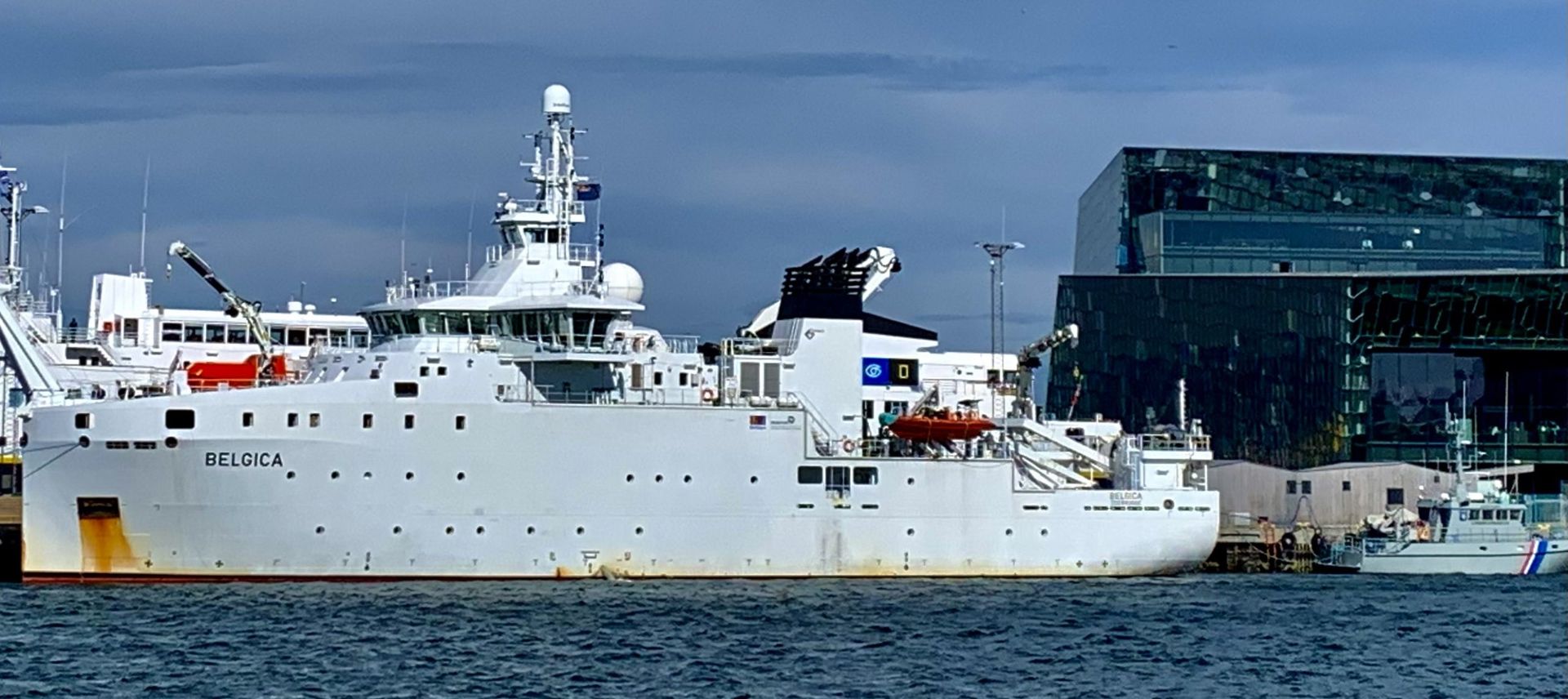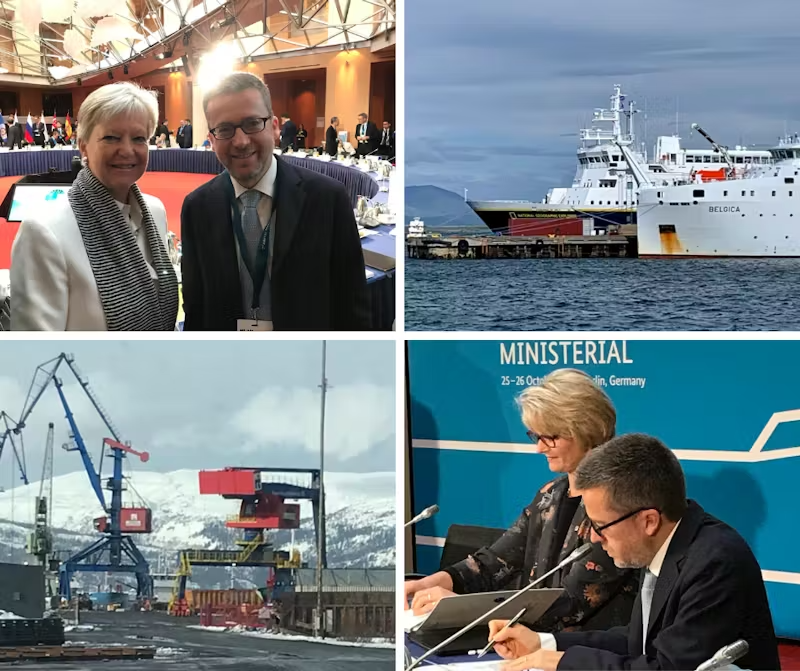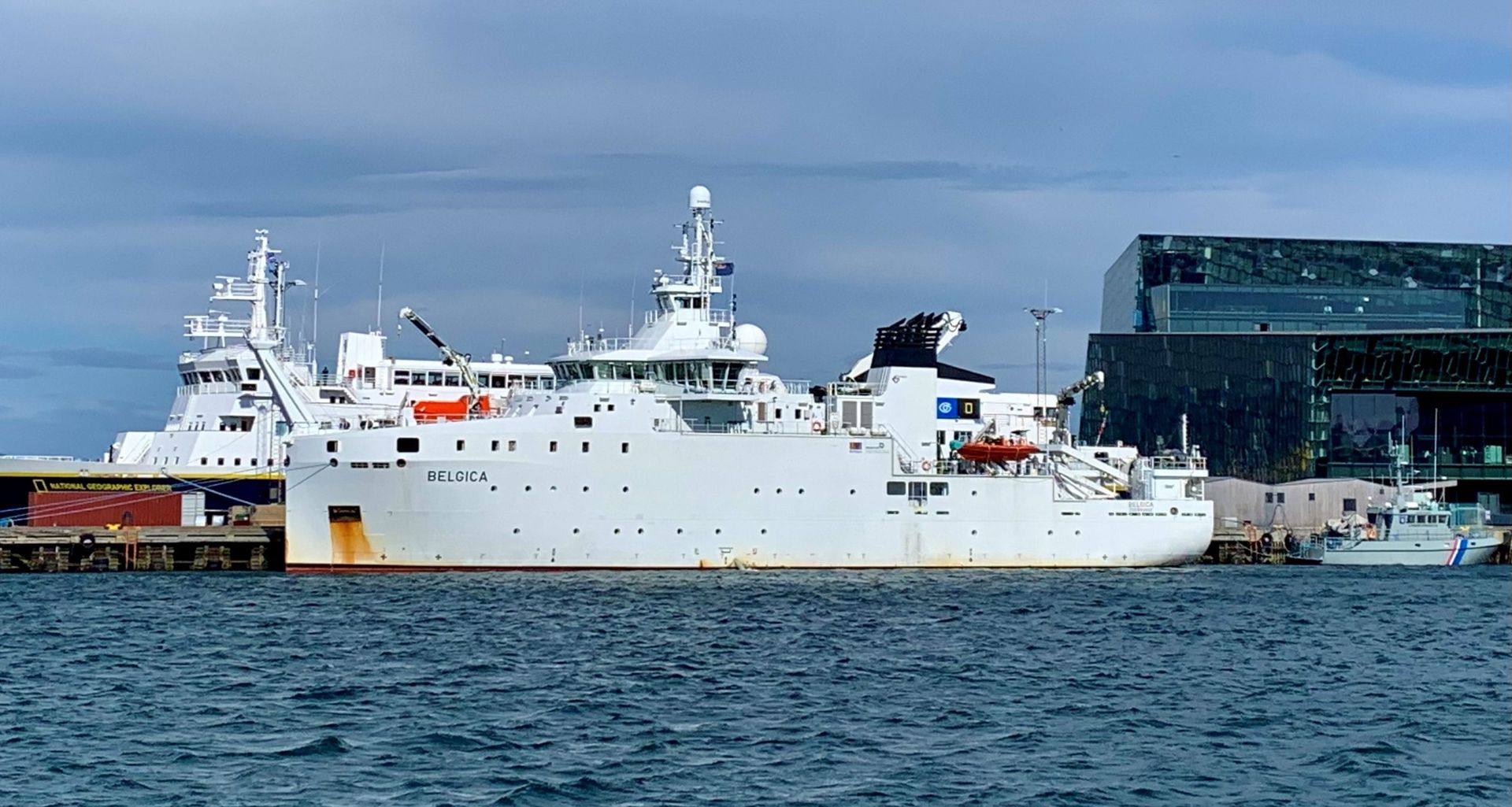PUBLIKATIONEN
PUBLICATIONS
The European Parliament Compels the EU to Address Arctic Security.
Commentary by Marie Anne Coninsx, published by the Egmont Institute - Royal Institute for International Relations of Belgium -
on 5 December 2025.

The European Parliament, by an overwhelming majority, urges the European Union to adopt a robust and security-focused Arctic strategy. It stresses that the Arctic is no longer a remote periphery, but a frontline for European security, especially due to Russia's militarization and
China's influence.
Science Diplomacy in and for the Arctic: Opportunities in Turbulent Times
By Marie Anne Coninsx, Senior Associate Fellow, Egmont Institute - Royal Institute for International Relations (Belgium)
and First EU Ambassador at Large for the Arctic

Science, research and innovation play a key role in increasing our knowledge of the Arctic, in understanding the changes of the region and hence in contributing to providing policy responses to the huge challenges it is facing. It is an illustration of the importance of science diplomacy. Science diplomacy has different dimensions. This article will address how science contributes to evidence-based policymaking in turbulent times.
While science and technology play an increasingly important role in the geopolitical arena, it has been claimed that science diplomacy in the Arctic has been severely impacted by geopolitics. Though some negative effects are clearly observable, it is worthwhile to assess the real dimension of the impact of reduced scientific cooperation with Russia. Indeed, a closer look at recent developments demonstrates that current geopolitics did create new opportunities for science diplomacy in and for the Arctic,
which cannot be neglected.
Belgium Needs a Bold Arctic Policy – Now
By Marie-Anne Coninsx (8 October 2024) In Egmont Institute

In the face of accelerating global climate change, the call for a Belgian Arctic Policy is not only obvious but urgently required. As the Arctic stands on the frontlines of climate disruption, Belgium must seize this moment to position itself as a key player in fostering security and stability
"Belgium Needs a Bold Arctic Policy – Now:
The Case for Investment in Research, fostering Security and Stability,
and Global Leadership"
In the face of accelerating global climate change, the call for a Belgian Arctic Policy is not only obvious but urgently required. As the Arctic stands on the frontlines of climate disruption, Belgium must seize this moment to position itself as a key player in fostering security and stability, as the foundation for the protection and sustainable development of this fragile region.
Europam servire et amare...
The New US Arctic Strategy. Welcome back, America!
By Marie-Anne Coninsx (15 December 2022) In Egmont Institute
On 7 October 2022, the US released its National Strategy for the Arctic Region, a welcome, important new policy. It marks a strong and clarifying shift in the US’s focus in the Arctic over recent years. Without exaggeration, one can say:” The US is back in the Arctic!”
The new strategy addresses major challenges that the Arctic has been increasingly facing since the US Arctic strategy of 2013. It provides for greater involvement of the Alaska Native Peoples, more international cooperation with US allies and partners, and it must be seen in the context of the current turbulent geopolitical context.
The new Arctic strategy brings new, or at least renewed, impetus to the US’s involvement in the Arctic file. “Renewed”, because there have been continuing US efforts to address the importance and challenges of the Arctic. But, especially over recent years, people often questioned whether the US actually did have an Arctic strategy. Despite impressive efforts from politicians in the region, especially from Senator Murkowski of Alaska, to provide visibility to the American High North, the Arctic was at the time not high on the US federal agenda. And when it did reach the news, it rather distressed the Arctic community.
Europe’s Energy and Resource Challenge. The Arctic is Part of the Solution.
By Marie-Anne Coninsx, Karen van Loon (12 September 2022) In European Policy Briefs
The EU’s increased climate ambitions require unprecedented growth in renewable energy and a diversified supply of critical raw materials. Building long-term partnerships and investing in innovation will be vital to pave the way for a clean and secure energy future.
With energy being used as a prominent geopolitical weapon and energy prices soaring, the need for enhanced energy security and reliable resource suppliers is essential. The EU has realized it must reduce its natural resources’ dependence to ensure its prosperity, safeguard its interests, and reinforce its strategic autonomy.
Especially the European Arctic region should be taken into account when considering the role it can play as a provider of renewable energy, sustainable development, and a reliable supplier of critical raw materials. Despite the specific challenges and costs associated with its cold and vulnerable climate, the region has certain advantages over parts of the world where political instability or low environmental standards are problematic. With its available resources, expertise, and technological innovations, the Arctic, which is often called an innovative testbed and a high-tech knowledge hub, can be instrumental for the EU to realize its Green Deal objectives, end its dependence on fossil fuels, strengthen its autonomy, and ensure its prosperity.
By Marie-Anne Coninsx, Senior Associate Fellow of Egmont - Royal Institute for International Relations (Belgium), Former EU Ambassador at Large for the Arctic.
Published in Arctic Circle Journal , 12 April 2022
"We can do without fossil fuels, certainly with less in the immediate future. However, exploring new oil and gas fields in the Arctic, should be an absolutely non-go."
"Sustainability is being affected in the Arctic, because the Arctic is not only local, it is also global. It generates global challenges; it requires global solutions to address them."
“The future of the Arctic region: what is at stake for Belgium?”, European Policy Brief, as co-author (together with Alexander Mattelaer and Frank Arnauts), published by Egmont Institute on 27 January 2022.
https://www.egmontinstitute.be/the-future-of-the-arctic-region-what-is-at-stake-for-belgium/
“Governing the Arctic: Key Challenges and Strategic Response from the EU”, in the book/publication edited by Professor Alessandra Pietrobon: “The Arctic: New Political and Legal Perspectives”; published by Giappichelli, Torino, 2021.
“European Union‘s Arctic Policy and its strong engagement on the Arctic”, in the special publication “Quaderno n. 18 - Arctic Connections” of the SIOI Quarterly Journal (SIOI: Italian Society for International Organisations), “La Comunità Internazionale” of June 2020. The publication has been also published on the website of the Italian Ministry of Foreign Affairs.
“The European Union’s Northern Window - a New View on the World”, Chapter Eleven of Book: “The European Union’s New Foreign Policy”, edited by Martin Westlake, published by Palgrave Macmillan (2020).
“The European Union: A Key and Reliable Partner in the Arctic and Beyond”, Guest Editorial in the European Foreign Affairs Review. October 2019; Volume 24, Issue 3.
Europam servire et amare...
(2016)
Europam servire et amare
Welcome to this publication "Europam servire et amare", which contains a selection of publications and speeches that I have given during a large part of my
mandate as Ambassador of the European Union to Mexico and thereafter to Canada. The statements address all current events and developments during these
fascinating postings. They covers the period from May 2010 to June 2015, and will be completed. Enjoy reading!
Bienvenidos a esta publicación "Europam servire et amare", que contiene una selección de las publicaciones y de los discursos que he pronunciado durante gran
parte de mi mandato como Embajadora de la Unión Europea en México y posteriormente en Canadá. Las declaraciones abordan todos los eventos y
desarrollos actuales durante estas fascinantes puestos diplomáticos. Abarcan el período comprendido entre mayo de 2010 y junio de 2015, y se completará.
¡Disfruta leyendo!
Willkommen zu dieser Veröffentlichung "Europam servire et amare", die eine Auswahl von Veröffentlichungen und Reden enthält, die ich während eines
großen Teils meines Mandats als Botschafter der Europäischen Union in Mexiko und danach in Kanada gehalten habe. Die Statements beziehen sich auf alle
aktuellen Ereignisse und Entwicklungen während dieser faszinierenden Postings.
Sie decken den Zeitraum von Mai 2010 bis Juni 2015 ab, und wird fortgeführt werden. Viel Spaß beim Lesen!
Europe cannot take peace for granted
(Article in “Ottawa Citizen”, May 9, 2014)
Europe Day - the anniversary of the Schuman Declaration - is an occasion to celebrate Europe's success in turning the page on a tragic period in our history and forging a common and prosperous future. It is an opportunity to commemorate past achievements and look to the future.
It is also a time for reflection. The crisis in Ukraine shows that we cannot take our hard-earned peace, freedom, and security for granted. In today's Europe, we see that democracy is a constant work-in-progress. We share the responsibility to defend and nurture it.
Sixty-four years ago, on May 9, Robert Schuman, the French foreign minister at the time, called for the unification of Europe to make war on the continent impossible and spread peace and prosperity on the European continent as well as globally...
Gender equality
(Organization of Women in International Trade (OWIT) - Newsletter, May 2014)
Slowly but surely, women have been making strides in business, trade, and administration since the 1960s. We all have our own stories to share, stories of how we got where we are, the challenges we faced along the way, our accomplishments, and the contributions we make to society day in, day out.
But despite all the efforts to narrow the gender gap in the workplace, female professionals are still under-represented in politics and in the economy. Regrettably, even in the sectors we dominate, women are sadly under-represented in leadership and senior positions. Data shows that women account for only 15.8 percent of board members and for a dismal 3.3 per cent of the chairs of boards in the largest companies across Europe.
Today, more than a century after the celebrated European chemist and Nobel Prize laureate Marie Curie was recognized as one of the most accomplished scientists of her generation, only 32 percent of scientists and engineers in Europe are women. An EU programme for researchers, the Marie Skłodowska-Curie Fellowships, is named after her....